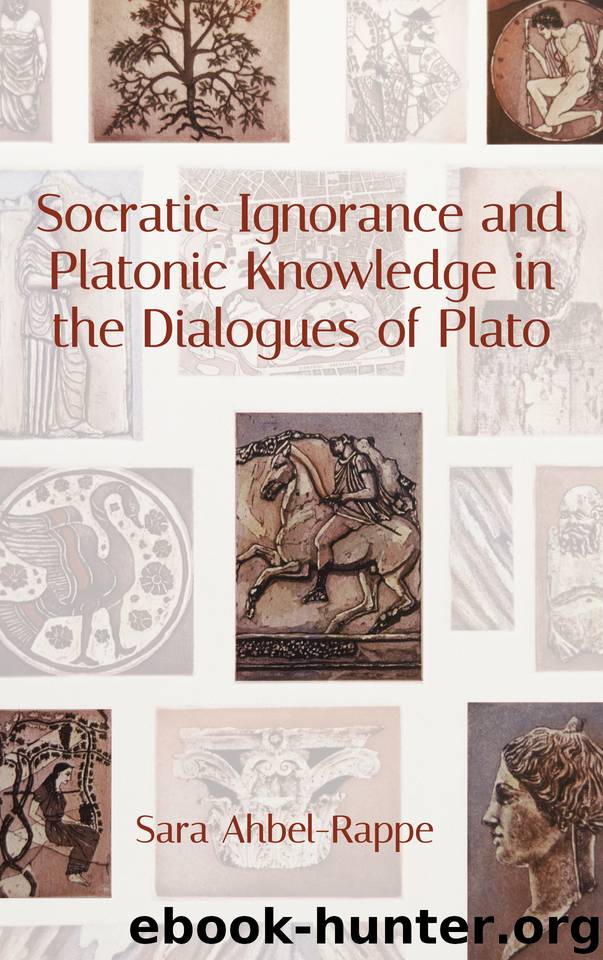Socratic Ignorance and Platonic Knowledge in the Dialogues of Plato (SUNY series in Western Esoteric Traditions) by Ahbel-Rappe Sara

Author:Ahbel-Rappe, Sara [Ahbel-Rappe, Sara]
Language: eng
Format: epub
Publisher: State University of New York Press
Published: 2018-04-24T16:00:00+00:00
CHAPTER SEVEN
FROM VIRTUES TO FORMS IN THE PHAEDRUS
One of the consequences of the severing of Platonism from the Socratic dialogues is a diminishment of the richness promised in self-knowledge. Instead, to study the Socratic persona within its Platonic frame is both to notice the centrality of self-knowledge to the entire Platonic enterprise and to notice the changing scope of what constitutes self-knowledge and its objects. In the Phaedrus we see the scope of self-knowledge as it progresses from the virtues to forms, all the while remaining markedly Socratic. Early on in the Phaedrus , we encounter Socrates’s iconic testimony to the constancy of this occupation: οὐ δύναμαί πω κατὰ τὸ Δελφικὸν γράμμα γνῶναι ἐμαυτόν· γελοῖον δή μοι φαίνεται τοῦτο ἔτι ἀγνοοῦντα τὰ ἀλλότρια σκοπεῖν (230a; I am not yet able to know myself, in accordance with the Delphic epigram. How very ridiculous is seems to me, when I am ignorant concerning this matter, to investigate foreign matters). 1 In this chapter, I discuss the Socratic quest for virtue as anything but the investigation of allotria , “foreign matters.” What I want to argue is that neither are the forms allotria , at least as they are encountered in the Phaedrus .
All too often, commentators restrict the scope of Socratic self-knowledge to mean what Nightingale (2010) refers to as an “awareness of his own intellectual limitations” that “evinces an understanding of his distance from truth and divinity” (11). 2 Yet in the later Platonist tradition, we saw, beginning with Alcibiades I , self-knowledge can be equated with divine knowledge. What I have been arguing is that the figure of Socrates most signifies the central place of self-knowledge in the philosopher’s search for virtue. Wisdom, of the kind that Socrates inspires and even presides over, is never knowledge of another. This counsel is something Plato repeats from time to time precisely by renewing his commitment to the figure of Socrates throughout the oeuvre. Even so, Socratic self-knowledge has been taken in a negative sense to refer to knowledge of one’s limitations, knowledge of what one does not know, and knowledge of one’s human fallibity. 3 It would seem that many scholars attribute this kind of self-knowledge to Socrates. One such view is represented by Nightingale, who applies a negative understanding of Socratic self-knowledge to the Phaedrus . Nightingale writes that Socrates becomes aware “that he has bumped up against his own epistemic limits” (11). And, she describes Socratic self-knowledge as an “awareness of [the philosopher’s] own intellectual limitations” (11). Yet, in this same essay, Nightingale goes on to talk about contemplative self-knowledge. Nightingale writes, with reference to the Phaedrus , that “in portraying the soul’s ‘vision’ of reality, Plato stages an ontological encounter between the human soul and the essences of the Forms” (25). Instead of severing Plato and Socrates by attributing knowledge to Plato and the limits of knowledge to Socrates, what would happen if we studied the Socratic within the Platonic? We begin to notice the centrality of self-knowledge to
Download
This site does not store any files on its server. We only index and link to content provided by other sites. Please contact the content providers to delete copyright contents if any and email us, we'll remove relevant links or contents immediately.
The remains of the day by Kazuo Ishiguro(8961)
Tools of Titans by Timothy Ferriss(8357)
Giovanni's Room by James Baldwin(7313)
The Black Swan by Nassim Nicholas Taleb(7097)
Inner Engineering: A Yogi's Guide to Joy by Sadhguru(6780)
The Way of Zen by Alan W. Watts(6589)
Asking the Right Questions: A Guide to Critical Thinking by M. Neil Browne & Stuart M. Keeley(5747)
The Power of Now: A Guide to Spiritual Enlightenment by Eckhart Tolle(5740)
The Six Wives Of Henry VIII (WOMEN IN HISTORY) by Fraser Antonia(5492)
Astrophysics for People in a Hurry by Neil DeGrasse Tyson(5172)
Housekeeping by Marilynne Robinson(4430)
12 Rules for Life by Jordan B. Peterson(4298)
Double Down (Diary of a Wimpy Kid Book 11) by Jeff Kinney(4257)
The Ethical Slut by Janet W. Hardy(4235)
Skin in the Game by Nassim Nicholas Taleb(4231)
Ikigai by Héctor García & Francesc Miralles(4228)
The Art of Happiness by The Dalai Lama(4118)
Skin in the Game: Hidden Asymmetries in Daily Life by Nassim Nicholas Taleb(3985)
Walking by Henry David Thoreau(3948)
